Archive for category General
Buenavista Listing
Posted by Miu x Sumire in General on 2020/03/30
INTANGIBLE CULTURAL HERITAGE
CUISINE
1. Tutong
2. Pinaltok
3. Sinukmani
4. Bukhayo
5. Kalamayhati na may buko
6. Puding na balinghoy
7. Diladila o Palitao
8. Atsara
9. Kinulob sa tuba na manok
10. Tiniping
11. Niyubak na balinghoy/saging
12. Pagong/Bao
13. Bayawak
14. Balatan
15. Gulamang Dagat
16. Nami
17. Lato
18. Bagulan
19. Pugita – Adobo
20. Coco Sugar/Coconut Sap
21. Balisongsong
22. Ulabi
23. Palyok-palyok
DANCE
24. Lulay
TRADITIONAL GAMES
25. Piko
26. Sikwit
27. Sipa
28. Kadang-kadang
BELIEF
29. Huwag pukpukin ng anumang bagay ang tungkuan at kakainin at pupuntahan ng kulag o wildcat ang mga alagang manok.
30. Bulong – kailangan baliktarin ang suot na damit.
31. Pangitain – ibinabaon ang suot na damit kapag nakita ang tao na walang ulo.
32. Pagkatay ng manok buwan buwan sa petsa ng kapanganakan hanggang sa 1stbirthday.
33. Wag mag walis kung may patay
34. Huwag pumitas ng mga bagay na buwigan
35. Gahoy nagsusuka o sumasakit ang ulo, nanlalamig ang siko.
36. Paglilipat ng bahay, kailangan unang dadalhin ang bigas, asin, tubig at mga samya.
37. Pagkinasal kailangan mauna ang babae sa paglabas ng simbahan
38. Pag nagpatuli ang lalaki bawal makita ng babae.
39. Kung magpapagawa ng bahay ang pinto ay harap na silangan at ang kabahayan ay dapat na nasa parti kanan pagpasok.
40. Pag-inom ng nilagang luya kapag nagdadalaga o manganganak.
41. Mga paniniwala ng Bagong panganak
PROVERBS
42. Ang maaga gumising ay masipag.
43. Daig ng maagap ang masipag.
44. Pag gusto ay may paraan, pag ayaw maraming dahilan.
SOCIAL PRACTICES
45. Pagmamano sa matatanda.
46. Putong
47. Kasal – Pamamanhikan, Sayaw sa Banig
48. Harana
49. Menstruation
50. Pagtutuli – traditional – tuli sa pukpok
ORAL TRADITION
51. Pasyon
52. Padasal Sa Patay 9 days – Siyaman, 40 days – kwarenta dias, 1 year – babang luksa
KNOWLEDGE & PRACTICES CONCERNING NATURE
53. Tandok
54. Wiping away of ipo-ipo during travel – the weapon is broom
55. Saklab
56. Pagbubuga
57. Sapi
58. Bulong
59. Gahoy
60. Enkanto
61. Paraya – kulam
FLORA
62. Balanoy (Basil) – Rayuma
63. Pandan
64. Luko-Luko – Dizziness
65. Luyang Dilaw
66. Coconut
67. Amorseko – ritual for boat-making
68. Oregano
69. Undan – medicinal, dizziness, kabag
70. Alugbati – food, bukol-bukol
71. Luya (native)
72. Deta
73. Ulasiman Bato/Pancit-pancitan
74. Serpentina
75. Antipolo
76. Mangkit
77. Acacia
78. Latoy
79. Damong Maria
80. Mirinda/Passion Fruit – Back pains
81. Tungkod hari
82. Bayabas
83. Herba Buena
84. Makahiya
85. Talahib
86. Rice
87. Corn
88. Mungbean
89. Peanut
90. Cassava
91. Watermelon
92. Cacao
93. Coffee
94. Banana
95. Pineapple
96. Papaya
97. Ipil
98. Lanzones
99. Guyabano
100. Rambutan
101. Narra
102. Fire tree
103. Dalugdog
104. Paragis
105. Awsip
106. Picas-picas – Acapulco
107. Malunggay
108. Tigbi
FAUNA
109. Buutin/Cloud Rat
110. Kalabaw
111. Baka
112. Kabayo
113. Kambing
114. Pabo/Turkey
115. Butterfly (Bila-Bila)
116. Sukat
117. Balinsasayaw
118. Pugo
119. Bayod (millipede)
120. Alupihan (centipede)
121. Kalapati – Pigeons
122. Bao – Pagong
123. Bayawak
124. Maya
125. Tuko
126. Uwak
127. Talabong – Tagak
ISDA/FISH
128. Umambang
129. Galunggong
130. Matambaka
131. Also
132. Lagidlib
133. Burot-burot
134. Haba
135. Espada
136. Tampal Puki/Flounder
137. Gulyasan
138. Bulador
139. Bolinao
140. Hamalik
141. Bun-ak – Parrot fish
142. Tangigue
143. Tulingan
144. Amarilis
145. Sihi
146. Pagi/Sting Ray
147. Tughod
148. Kuray
149. Pugarot
150. Igat
151. Igod
152. Manglit/Big clam
153. Tak-takin
154. Tam-isang
155. Pating
156. Pugita
157. Tikig
158. Lumba-lumba
159. Budjong
160. Bagulan
161. Mariano
162. Sigapo
163. Banahan
164. Banak
165. Alimasag
166. Hipon
167. Lobster/Ulang
168. Kagang
169. Kalapay
170. Suso
171. Sikad-sikad
172. Pla-pla
MANUFACTURING INDUSTRY (Map the Process)
173. Coco Sugar
174. Vinegar
175. Furniture Factory
176. Bagoong
177. Rattan%
Mogpog Listing
Posted by Miu x Sumire in General on 2020/03/30
List of Local Cultural Heritage of Mogpog, Marinduque
(as of today, June 29, 2018)- 286
Tangible Immovable Heritage- 23
- Public Market
- Rolinda’s Store
- Balanacan Port
- Mogpog Central School (MCS)
- Cockpit
- Marinduque Academy Main
- Marcos Type School
- Quezon Roxas Highschool
- Isidore Church
- Our Lady of Good Voyage
- Bacod Pier
- Fountain in MCS
- Well in Anapog/ Sibucao
- Brookside
- Danao
- Public Catholic Cemetery
- Municipal Cemetery
- Camarines (Pinagbateryahan)
- Abondoned Mining Site
- Cardinal Vidal’s House
- Calderon’s Ancetral House
- Go’s Ancestral House
- Deogracias’ Ancestral House
Natural Heritage- 32
- Lumandes
- Sinkhole in Lumandes
- Luzon datum
- Camarines
River
- Mogpog River
- Bintakay River
- Pili
- Balanacan
- Sayao
- Magapua
Marshland
- Capayano
- Ino
- Nangka II
- Balanacan
- Guisian
- Argao
- Sayao
Rock Formation
- Basyao
- Tarug
- Manlumod
- Silangan
Sandbar
- Silangan
- Ulong Bay
Rock Shelter
- Tarug
- Sayao
Cove
- Balanacan Cove
Estuary
- Ubog-ubog
- Ulong
Waterfall
- Padjao
- Busay
- Pili
- Miray
Flora- 24
- Alugihib
- Bago
- Palad Buwaya
- Kabatete
- Santol
- Rosas
- Santan
- Fern
- Bulbol dalaga (Tabubot)
- Nami
- Tugi
- Yagine
- Mulawin
- Aratiris
- Balimbing
- Niyog
- Sasa
- Buli
- Nito
- Bigas na malagkit
- Apatut
- Talhan
- Palakupak
- Anus
Fauna- 19
- Lapu- lapu
- Igat
- Kalapay
- Kuhol
- Paros
- Buyaso
- Kuray
- Kamukun
- Tagak
- Bayawak
- Uuk
- Carabao
- Gurami
- Kwago
- Milipedes
- Saga- saga
- Native Chicken
- Native pig
- Balinsasayaw
Intangible Cultural Heritage- 103 and counting
Oral Tradition
- 10 Alamat of baranggays
- Pasyon
- Responso
Kwentong Bayan
- Bulong
- Kapre
- Baboy- baboy
- Kataw
- Aswang
- Santermo
- Kalesa
Social Practices
- Putong
- Harana/ Pamamanhikan
- Bayahanihan
- Pagmamano
Traditional Cuisines
- Adobo sa dilaw
- Bukayo
- Atsara
- Ampao
- Kalamay Hati
- Panganan
- Niyubak
- Siroy
- Pasulbot
- Tuba
- Latik
- Maja
- Buloy- buloy
- Pinaltok
- Bulalo
- Tinigang
- Tinapa
- Sinukmani
- Pakumbo
Performing Arts
- Bati (Easter Rites)
- Pascali
- Buling- buling
- Palarupak (Instrument Music)
- Moro- moro (Comedia)
- String guitar playing
Traditional Games
- Patubil
- Tumbang Preso
- Taguan
- Taktaraok
- Piko
- Sitso
- Tsato
- Sungka
- Kadang- kadang
- Sungkayao
- Sipa
- Luksong Tinik
- Luksong baka
Workshop Rites
- Moryon
- Sabitan ng pera
Rites of Passage
- Pagtutuli
Birth/ Wedding/ Funeral rituals
- Inunan
- Pusod
- Buhok ng bata (unang gupit)
- Pagbaligtad ng bata
- Pagtatawin ng bata sa ibabaw ng ataul
Fiesta/ Festivals
- Kangga
- Banca- banca
- Fluvial (Argao/ Silangan)
Traditional Ecological Wisdom
- Fishing (please enumerate)
- Farming (please enumerate)
Knowledge about local fauna and flora
- Herbal medicines (please enumerate)
- Mababang lipad ng balinsasayaw
- Maraming gamu- gamo
- Tuko
- Guyam
- Pagbulaklak ng dapdap
Subsistence Technology
- Bagoong
- Traditional way of fishing (please enumerate)
- Traditional way of farming (please enumerate)
Traditional Healing system, rituals, beliefs
- Paghihilot
- Pagtatawas
- Saklab
- Laway/ Buga
Cosmology
- Eclipse
- Full- moon
- Starry night
Expressions
- “ay”
- Mandin
- Ngani
- “ma”
- Baya
- Mettalurgy/ Smithing
- Basketry- Nito
- Carving- mask making
- Woodworking
- Sculpture
- Boat- making
- Shelter making
- Painting
Tangible Movable- 51
Religious Image
- San Pedro
- San Juan
- Marta
- Veronica
- Magdalena
- Jesus Nazareno
- Mahal na Ina
- Entierro
- Del Carmen
- dela Column
- Paglilibing
- San Jose
Farming
- Araro
- Suyod
Fishing
- Lambat
- Bangka
Household Items
- Chair
- Old Table
- Lamp
- Side Table
- Kandelabra
- Old Piano
- Bed
- Cabinet
- Baul
- Aparador
- Lagayan ng unan
- Tapayan
- Pinggan
- Jar
- Kubyertos
- Gilingan
- Almires
- Kayuran
- Sandok
- Palayok
- Platera
- Supera
- tahihip
- Old clothes
- Gusi
- Batya
- Palo- palo
Work Implement
- Sewing machine
Archival Holdings
- Baptismal book
- Old photographs
- VHS
- Betamax
- Manuscripts
- Old coins
- Medals
Personalities/ Institutions- 34
Local Heroes
- Genie Luna
- Rafael Lasic
- Pinagbateryahan fighters
- Death March
Govn’t Officials
- Lauro Go
- Antonio Labatete
- Lope Logmao
- Garcia Go- Educator
Artists/ Cultural Worker
- Ato Morales
- Meliton Lagustahan
- Gloria Lacerna
- Jacobe Janili
- Marianito Leyco
Associations
- Banda de Mogpog
- Sining at Kultura Mogpogueno
- Samahan ng mga Moryon
- Putong ng Samangga
- Putong ng Mataas na bayan
- Putong ng Pinbatakay
Soldiers
- Jorge Jardeleza
- Rodolfo Mensanto
- Felix Bente Milambing
- Jose Marciano Garcia
- Ruberto Molato
- Rafael Garcia
- Pedro Licop
Institutions
- Marinduque Academy Inc.
- Quezon Roxas Highshool
- Rural Improvement Club
Family/ Clan
- Narvaez
- Mansanito
- Marciano
- Labatete
- Los Banos Monterey
downloable forms
Posted by Miu x Sumire in General on 2020/03/30
welcome to Jisho to Chizu: Knowing y/our own Culture Digital version
Posted by Miu x Sumire in General on 2020/03/30
In lieu of the COVID19 which prompted the Marinduque under the Luzon Enhanced Community Quarantine since March 15 until April 15, there would be key changes and modifications. The EdM02: Advanced Foreign Language (Nihongo/Nippongo) class has traditionally required the learners to provide some deliverables in the course of seven meetings. The EdM02 learners are supposed to submit accomplished writing practice sheets based on the first Katakana Table: sound of 50. Then the Nihongo learners are going to produce hard and laminated copies of the 50 Katakana flashcards. Then there’s the cultural mapping forms which the Nippongo learners are going to base their flashcards and their respective reflections.
The reflection is the culmination of their both EdM01 and EdM02 learnings about Hiragana and Katakana along with their Pecha Kucha capsule proposals. The reflections are memorized and recited aloud during the culminating activity during the last meeting. Then finally, the cultural mapping forms along with the reflections in Romanji, Katakana and English is compiled in the form of a proceedings. The Katakana flashcards need not be printed and laminated anymore, softcopy and digital version would suffice. The reflections in Japanese during the culminating activity need not be actual but can take a virtual form such as a Vlog. The EdM02 learners are going to record themselves and post in a common blog for everybody to hear and see.
Despite the health concerns and state of medical emergency, the MSC School of Graduate and
Professional Studies needs to innovate and go on with the next frontier of higher learning and advanced studies. With the help of alternative modalities, distance learning and online mode, everything is made possible.
Dr. Randi Nobureza
EdM02: Advanced Foreign Language
2ndsemester 2019-20
MSC School of Graduate and Professional Studies
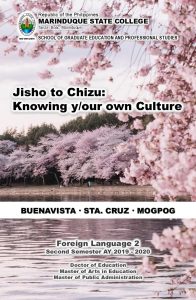
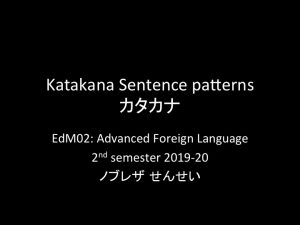
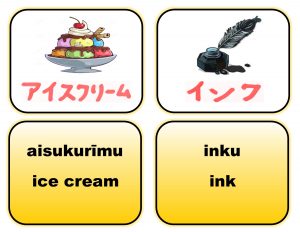
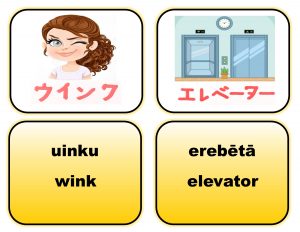
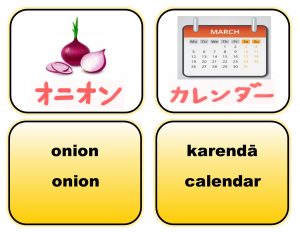
Recent Comments